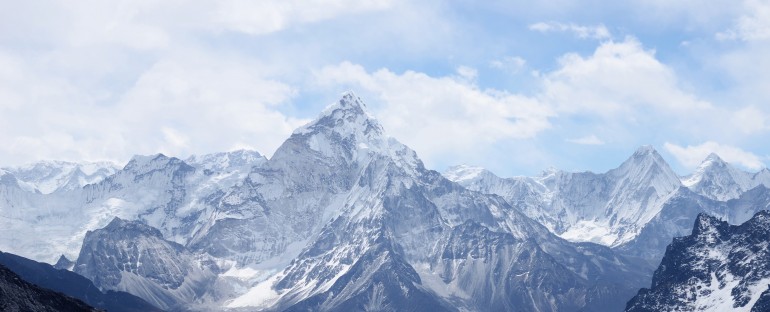Recently, I happened to watch two inspiring documentaries. The first followed the extraordinary journey of three men who climbed to the summit of Meru, a mountain in the Himalayas. All previous attempts had failed, and the summit had been considered unreachable. The second film documented the nine-month voyage of six women who, incredibly, rowed eight thousand miles across the Pacific Ocean. Both extreme adventures required overcoming impossible obstacles, facing the ultimate physical and mental challenges that presented real confrontations with death.
Most of us will never purposely encounter such extreme hurdles, but we all face challenges on our life journeys that feel insurmountable. What can we learn about our own lives from these people who push the limits of human capability? Obviously, they had strength of will, courage, vision, motivation, and an ability to persevere. What if we applied that kind of resolve to our spiritual evolution?
What compels us to do the things we do? Our basic motivations for action are to avoid suffering and to be happy. Ultimately, we are seeking completion, fulfillment, wholeness. But no matter what we complete in the world, there will always be a sense of dissatisfaction unless we are rooted in the present. As long as we are lost in the action, there will be a sense of incompletion and a desire for further action. There will always be another mountain to climb or ocean to cross. Our tendency to search everywhere else for happiness except where we are here and now keeps us from the very thing we are searching for.
Even objectives as extreme as reaching the summit of Meru or rowing across the Pacific, are not as challenging, in some respects, as awakening from our conditioning, our habit-based lives, and discovering true fulfillment, lasting happiness. Our greatest challenge—our mountain or our ocean—is to overcome our own programming. It is so difficult because it is impossible to apply the same methods that work in the material world. As a spiritual mentor explained about the inner journey: “There is actually no mountain to climb. There is only our own conditioning to overcome that tells us there is a mountain to climb.” We are trying to conquer an illusory ‘enemy’—our ego-self.
Extreme adventurers who push the limits of what is humanly possible provide us with incredible inspiration that we can translate into expanding our consciousness—rising above our limited view of ourselves—not just physically and mentally, but becoming acquainted with the deeper level of our being that is unlimited by space and time. This is the purpose of the spiritual path, which, like the path to the summit of Meru requires great effort (although a different type of effort) and grace along the way.
We are each tasked with facing the particular challenges our life presents. The key is to view the challenges as opportunities to grow and evolve. Only when we fully face the obstacles in front of us can we overcome them, or realize they are not hurdles at all. If the Meru climbers had ignored the life or death obstacles they encountered on their path to the summit, they would have died. The first step is to acknowledge and accept rather than resist what is. In our everyday lives, when we resist what is, we may not die immediately, but are we are fully alive?
Facing our challenges requires surrender, but surrender doesn’t mean giving up. It’s an attitude that allows space for grace to help us deal with the situation either through acceptance or overcoming. When encountering life or death situations, like the adventurers, surrender is sometimes the only option. Surrender is not an action that can be done, but rather, a gift that comes to us when we are open and receptive. The purpose of the spiritual path is to allow us to surrender and receive the grace that is always available. The ego-mind is limited. When we open to the Infinite, we have access to unlimited possibilities.
Like those death-defying adventurers, people feel a heightened sense of vitality when living on the edge. Maybe we need to acknowledge that we are living on the edge, no matter how mundane our lives appear. We are living on the razor’s edge between past and future, between life and death, between joy and sorrow. Our work is to stay awake to the reality that all we have is here and now. As the spiritual masters tell us, this moment is rich and full and complete as it is—there is no need to look elsewhere to feel alive.
The men reached Meru’s summit, and the women reached their destination against all odds, which means there was something involved that was beyond human will. I couldn’t help thinking as I watched them finally achieve their goals, that when we reach our limit, it is grace that takes us across the finish line. In the same way, when we set out on our journey to discover Truth, we put ourselves in the hands of a power greater than our limited ego-self, that guides us on our way.
We are each climbing our own mountain, crossing our own ocean. Are you allowing grace to support you on your journey? Happy climbing! Happy rowing!
Consider This: Lasting happiness and fulfillment is not found in the achievement of a goal, but in surrendering to what is.
Recent Posts
Recent Comments
- Terry Scott on CONTEMPLATING THE UNKNOWABLE
- Irene Kokatay on THE PATH OF SELF-KNOWLEDGE
- Terry on THE PATH OF SELF-KNOWLEDGE
- Irene Kokatay on LIVING IN INFINITY
- Terry Scott on LIVING IN INFINITY




